
The Trump administration is sending 700 Marines and an additional 2,000 members of the National Guard into Los Angeles following four days of protests against militarized immigration raids. Rob Bonta, attorney general of California, sued to block the use of National Guard troops on Monday. “Unfortunately, I think [Trump] wants conflict,” said Bonta. “He wants something to erupt so that that provides the basis for him to try to grasp and seize additional power.” Bonta’s office is pursuing more than two dozen lawsuits against the Trump administration.
Transcript
AMY GOODMAN: This is Democracy Now!, democracynow.org. I’m Amy Goodman, with Juan González.
As we continue to cover the Trump administration sending troops into the streets of Los Angeles, we’re joined by California Attorney General Rob Bonta. On Monday, he sued the Trump administration for deploying the National Guard without the consent of California Governor Gavin Newsom. The lawsuit came a day after Trump’s border czar, Tom Homan, threatened to arrest Newsom and Los Angeles Mayor Karen Bass for obstructing immigration enforcement. On Sunday night, Governor Newsom responded to Homan’s threat during an interview on MSNBC.
GOV. GAVIN NEWSOM: Come after me. Arrest me. Let’s just get it over with, tough guy. You know? I don’t give a damn. But I care about my community. I care about this community. The hell are they doing? These guys need to grow up. They need to stop. And we need to push back. And I’m sorry to be so clear, but that kind of bloviating is exhausting. So, Tom, arrest me. Let’s go.
AMY GOODMAN: On Monday, President Trump told a reporter he would support Homan arresting Newsom. He said, quote, “I would do it I were Tom.” Listen carefully.
REPORTER: He’s daring Tom Homan to come and arrest him. Should he do it?
PRESIDENT DONALD TRUMP: I would do it if I were Tom. I think it’s great.
AMY GOODMAN: “I think it’s great,” said the president.
We’re joined now by Rob Bonta, the attorney general of California.
Welcome to Democracy Now! If you can start by explaining your latest lawsuit — what is it: 23 or 24 against President Trump? — around the National Guard? And then, are you planning to sue around his deployment of 700 Marines?
ATTORNEY GENERAL ROB BONTA: Thank you for having me. I’m honored to be with you.
We’ve brought 25 lawsuits in 20 weeks, more than one a week, because that is how blatantly and brazenly, consistently and frequently the president has violated the law. He is a repeat offender when it comes to breaking the law.
And yesterday, we filed our lawsuit against the Trump administration for their unlawful deployment of the National Guard into Los Angeles. They rely on a law — It’s called 10 USC § 12406 — which requires a rebellion, which there is not; a invasion, which there is not; or the inability for the federal government to execute the laws with the, quote, “regular forces,” which doesn’t exist, either. So, none of the required elements of the law are there to trigger the use of the authority to deploy the National Guard. And the law also requires that the president issue the order to bring in the National Guard through the president — or, through the governor, excuse me, meaning the governor has to consent to it. And Governor Newsom has strenuously objected to the National Guard coming in.
So, we believe, on the plain and unambiguous language of the law, there’s no authority to call in the California National Guard. The California National Guard is a joint operation. The commander-in-chief is the governor of California in most times, but the president, if there is a clear statutory authority, can call them in. There is no clear statutory authority here. So we’re asking the court to declare invalid the president’s order to call in the National Guard, and to order them unlawfully present.
JUAN GONZÁLEZ: And, Attorney General, at a —
ATTORNEY GENERAL ROB BONTA: And, excuse me, and the Marines.
AMY GOODMAN: Attorney General, at a —
ATTORNEY GENERAL ROB BONTA: Sorry, and we’re also looking closely at the Marines.
JUAN GONZÁLEZ: At a news conference on Monday, ahead of filing the lawsuit, you accused Trump of, quote, “trying to manufacture chaos and crisis on the ground for his own political ends.” What do you think Trump’s aim is here?
ATTORNEY GENERAL ROB BONTA: He wants conflict. He wants chaos. He wants confusion. We, on the other hand, in California, we want peace. We want calm. We have the largest sheriff’s department in the nation, in the Los Angeles Sheriff’s Department, the third-largest police department in the nation, in the L.A. Police Department. They are very well resourced, highly trained men and women, fully capable of addressing any issues that are attendant to the mostly peaceful protests. They have, fully within their resources, the ability to address all challenges when it comes to public safety.
The president, by bringing in — first, authorizing 2,000 National Guard members, and then another 2,000, and then 700 Marines, he is unnecessarily and counterproductively escalating. He’s inflaming tensions. He’s provoking a situation. Unfortunately, I think he wants conflict. He wants something to erupt so that that provides the basis for him to try to grasp and seize additional power. His throughline and his modus operandi is to just seek more power. That’s why he calls everything that’s not an emergency an emergency. He calls things that aren’t an invasion an invasion. He uses that language very specifically, because those are the triggers to give him more authority. But he can’t change the facts on the ground just by lying about that factual scenario. And unfortunately, we think chaos and confusion is the end goal, and that’s why we’re urging everyone to be peaceful, lawful, safe in their protest and exercises of their First Amendment rights.
JUAN GONZÁLEZ: And you’ve also said that the January 6th, 2020, events in Washington were far closer to meeting the definition of a, quote, “rebellion” under the section of law that Trump is evoking, yet, obviously, he defended many of the protesters back on January 6th. Your response to the double standard here?
ATTORNEY GENERAL ROB BONTA: Absolutely consistent with President Trump’s ongoing hypocrisy. He says, for example, he’s going to go after undocumented violent criminals, and he goes after 2-year-old children and people lawfully present and refugees seeking safety when they have persecution and violence at home. And to call what’s happening in Los Angeles a invasion or a rebellion just defies credulity, and especially when there was something closer to a rebellion, a armed attempt to overthrow the leadership of the United States and place in power a president who wasn’t duly elected, and displace someone who was duly elected. But he stood by and was not involved in that situation, though he tries to insert himself into what’s happening in California when it’s fully under control with the local law enforcement. So, his throughline is to seize as much power as possible, lie about the facts on the ground to justify those seizure attempts, and is often, as you’ve just recognized, hypocritical.
AMY GOODMAN: Attorney General, will you investigate whether the FBI has provocateurs provoking violence in L.A.?
ATTORNEY GENERAL ROB BONTA: You know, we’re interested in evidence, in facts. If there is information shared with us that leads us to believe there is unlawful conduct, we’ll go where the facts go and where the law takes us.
Right now my understanding about what’s happening on the ground in Los Angeles is there are mostly peaceful protesters exercising their time-honored and constitutionally supported rights to freedom of expression, freedom of association and freedom of speech. Unfortunately — and I’ve seen this time and time again — when you have peaceful protests, there are often those who use those protests as a cloak for their participation in unlawful activities and chaotic activities. They have nothing to do with the underlying subject matter that’s being protested, but they use the opportunity to create some chaos and some division. Those folks need to be held accountable, arrested, prosecuted to the full extent of the law. That is not what we need right now, and that is not consistent with First Amendment rights and uplifting our democracy.
JUAN GONZÁLEZ: Also, have you heard or been in communication with attorneys general in other parts of the country? Are they actively preparing for an event like this to happen in their state, as well?
ATTORNEY GENERAL ROB BONTA: I’m proud to say that the Democratic attorneys general talk consistently, regularly. We prepared for months before the presidential election. We’ve been talking every week, and often every day, in preparation for the unlawful actions and undemocratic actions and unconstitutional actions that define this presidency. We spoke yesterday at length. They were very supportive. Many reached out to me over the weekend as the events unfolded in Los Angeles, and for that, I’m grateful for the camaraderie, for the collaboration, for the teamwork.
And yes, the Democratic attorneys general are very well aware of what the executive order says. It is not specific to Los Angeles, nor is it specific to California. It applies potentially nationwide, including in any one of their states. That’s why the Democratic governors spoke out against this unprecedented and unnecessary and counterproductive step taken by the Trump administration to deploy National Guard. And it’s also why Democratic attorneys general are on high alert for what happens next. Los Angeles and California may be the first place, but, unfortunately, may not be the last place where this unlawful action by the president takes place.
AMY GOODMAN: Rob Bonta, can you explain what Los Angeles being a sanctuary city and California being a sanctuary state means? But first, one protest leader suggested the other day that Governor Newsom can order the National Guard to stand down. Is that true?
ATTORNEY GENERAL ROB BONTA: Let me answer the second question first. The governor is the commander-in-chief of the California National Guard. And unless or until there’s a specifically triggered statute that authorizes the president to call in the National Guard — and that is rare and infrequent and has not occurred here — then the governor is the commander-in-chief. But the president can be involved when there’s clear statutory authority.
Right now the president has called in the National Guard. The National Guard, guardspeople themselves, they should have clear directions with clear orders and a clear mission. That’s why we’re going to court, to make it clear, to make it clear that the president’s orders are invalid and unlawful. And then they would come back under the leadership and command of Governor Newsom. But it needs to be clear, in our view, through the court, not some wrestling match between the governor and the president where the National Guard’s people are left confused. We go through the normal process, the appropriate process, which is the courts, to declare invalid the president’s actions.
Los Angeles and California, to your first question, are pro-public safety jurisdictions. We want to use our public safety resources, our law enforcement resources, on tackling criminal laws, enforcing criminal laws, on investigating, arresting and prosecuting criminals, people who rob, people who murder, people who rape. And we will leave the immigration, the civil immigration enforcement — it’s not criminal — the civil immigration enforcement, to the agencies and departments in the federal government who work on that. We think by deploying our resources to enhance public safety, we have a safer community. By not being directly involved in most cases, with some exceptions in the statute, in civil immigration enforcement, more victims will come forward to report crime. More witnesses will come forward to cooperate with law enforcement. It makes our communities safer. That is our choice. And it’s fully consistent with our constitutional rights under the 10th Amendment to use our not unlimited and often scarce law enforcement resources to enhance public safety and to leave civil immigration enforcement to the federal government. The federal government can do their job. If they do it lawfully, we will not obstruct, we will not interfere. But they cannot conscript, commandeer, draft into service, force local law enforcement to do their job for them. They must do their job, while we decide — while we have decided to focus on enhancing public safety through enforcement of criminal laws, not civil immigration enforcement.
AMY GOODMAN: Rob Bonta, we want to thank you for being with us, attorney general of California, speaking to us from Los Angeles.
Next up, an update on Kilmar Abrego Garcia. He’s back in the United States, but the federal authorities have jailed him in Tennessee. Then, on to the Gaza flotilla. Stay with us.
[break]
AMY GOODMAN: Roger Waters performing “We Shall Overcome,” accompanied by Alexander Rohatyn on cello, here in our Democracy Now! studio.

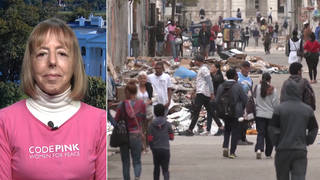
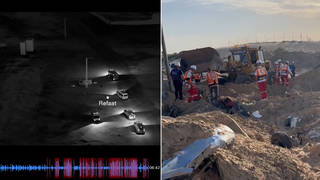

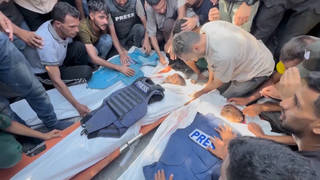





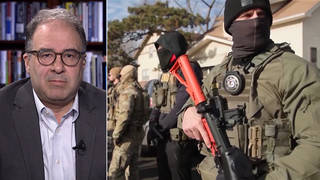
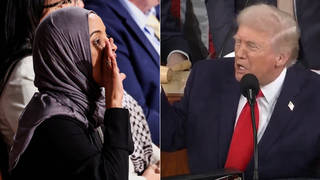
Media Options